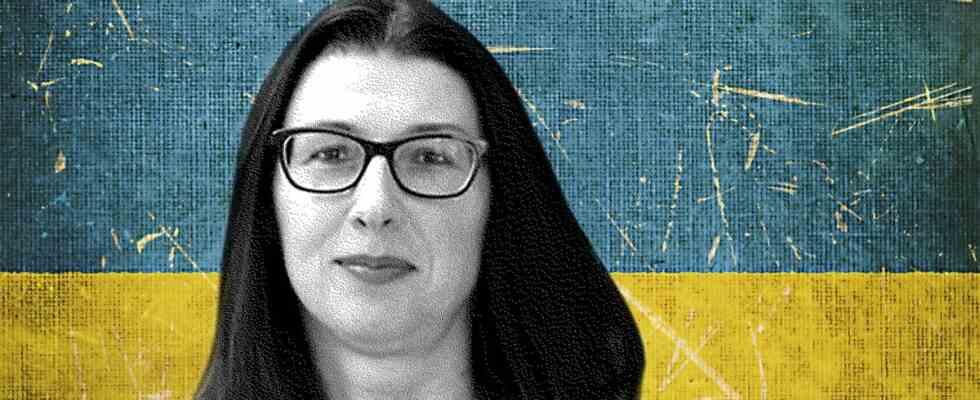Just before midnight on April 2nd, I received a message from an unknown number on the Viber chat service. “I’m K., on March 8 I spoke to German journalists at the train station in Chernivtsi (Czernowitz) while I was waiting with my mother and 93-year-old grandmother for the bus to the border crossing. Can I still watch the program somewhere?” Of course I remember them, K. said in English that they wanted to go to a relative in Bulgaria. I ask where they are now. Still in Bulgaria, everyone is very homesick. K. writes: “A few days ago I had such a strong desire to just come home, kneel down and touch the ground with my head … to feel it.” I can only imagine how it feels for her when she writes to me, a stranger; we only talked for half an hour.
Later, in bed, I have a lot to think about. I don’t know exactly where in the Kiev area K. comes from. Perhaps he was spared from combat operations. But maybe it is one of the places that have been liberated in the last few days and that will now go down in history as the sites of new war crimes. Journalists from Reuters, Agence France-Press and the BBC can document these – important for Ukraine because they will hopefully be recognized as an “independent third party”. I don’t need to describe what you see in these photos – you see them on the web and in newspapers. But let me ask you a few questions. Is Putin solely responsible for the war – and consequently for all the death, destruction and suffering it brings? How tenable can this claim be today, on the 39th day of the Russo-Ukrainian War?
Who are these beings who, coming from the Russian Federation, murder, torture, rape, destroy and plunder – all of this also in the civilian sphere? Clones of the Russian President? If they all profess to be part of the “Russian world”, may I assume that many of them were brought up and educated “in the bosom of the great Russian culture”? That they might read Russian literature, listen to Russian music, admire art treasures in museums? At least in school? I am aware of the fact that there were quite a few among them who were “uneducated”. Only: difficult to imagine with high-ranking supreme commanders.
As atrocious as the crimes committed by the Russians in Ukraine are, much of it seems painfully familiar to me
In a survey conducted by Belsat TV (the channel is the only Belarusian alternative to state television) in Kazan, the capital of the Republic of Tatarstan, the answer to the question was: “Do you think that the special military operation in Ukraine should be continued because its goals? have not been reached yet?” eleven out of 14 people convinced-affirmative. To be precise, 21.5 percent are against or against it. Not representative? Perhaps if one didn’t have the much more meaningful data from the analytical Levada Center, which is not exactly in line with the regime. According to this, 53 percent of the respondents “unconditionally support” the “military special operation” and 28 percent “tend to support it” (as of January 31, 2022). Anyone who still believes in the myth of the “bad tsar” and “good people” should take a stroll through the Russian Internet. One can only pity the few people who are actually critical of the government. Bad luck. hostage of the system. And yes, I want to get at collective responsibility, which is probably a foreign word for Russians.
As gruesome as the crimes committed by the Russians in Ukraine are, I find that much of it seems painfully familiar to me: from the literature. When I see and hear photos, videos and descriptions of witnesses, it sometimes seems to me that they are scenes from works such as “Baturyn” (1927) by Bohdan Lepkyj, “The Horde” (1992) by Roman Ivanychuk, ” The Garden of Gethsemane” (1950) or “Tiger Catcher” (1944) by Ivan Bahrjanyj – to name just a few of many that deal with the brutal extermination of Ukrainians since the 18th century. The latter appeared in German in 1962 under the title “The Law of the Taiga”.
The novels by Bahrjanyj, born in Kusemyn in 1902, are autobiographical and tell of his experiences as a prisoner in NKVD pre-trial detention, in camp detention and on the run from Siberia. As a Ukrainian, he had no lobby in the West, where he had lived since 1945, like Alexander Solzhenitsyn – although his work deserved no less a Nobel Prize than that of the Russian author in exile. However, the information about the publication on the German website of the working group for young people’s literature still contains the note “Original language: Russian”. So much for the differentiated handling of the East Slavic literatures.
Read more episodes of this column here.

